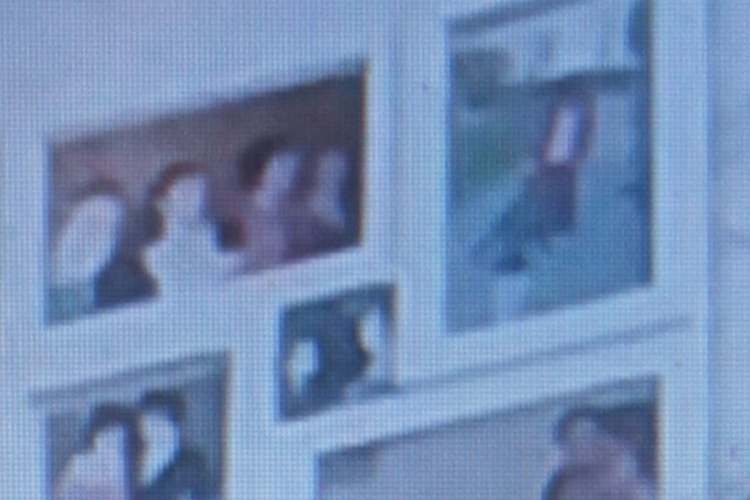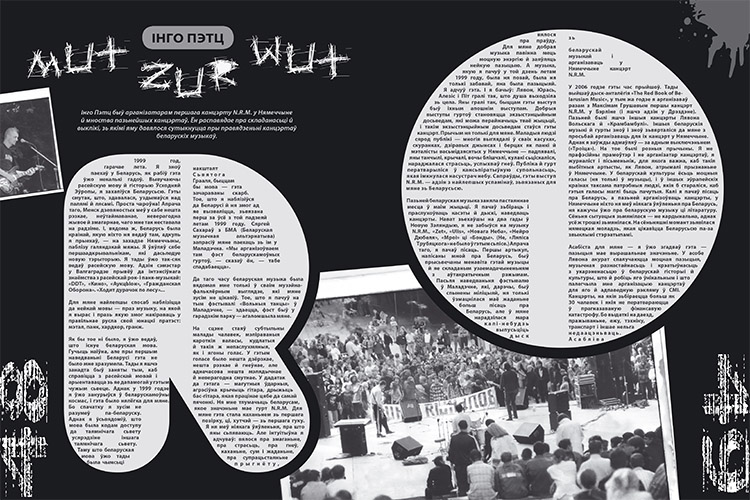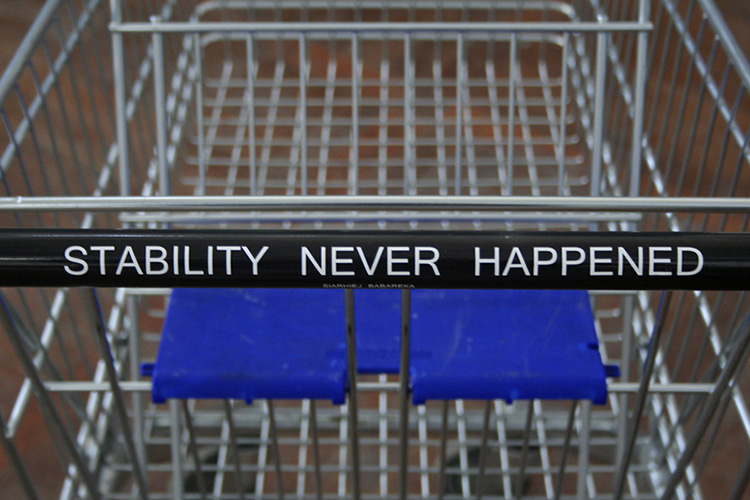
Аўтар: Tania Arcimović, 20/10/2015 | CINEMA Cult Aktivist person
АNDREI KUDZINIENKA: CHALLENGING THE NEW WORLD
A year ago Belarusian director Аndrei Kudzinienka started implementing his new idea which later took the form of «Chronotop». It is a networking multimedia project Аndrei himself describes as «an artistic chronicle of our everyday life, or everyday-mythological chronicle».
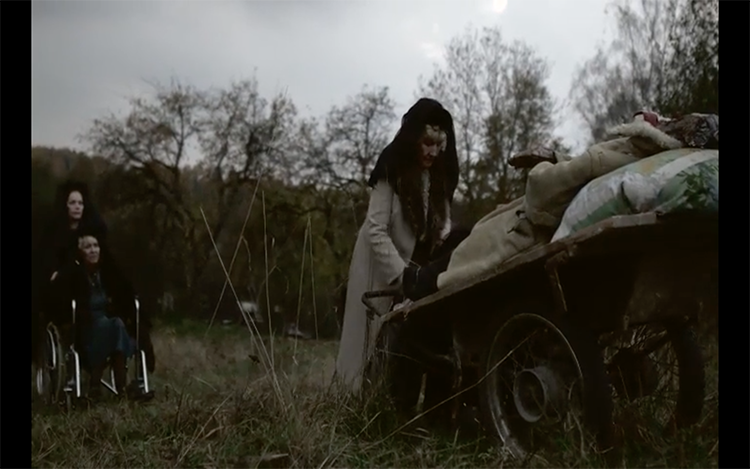
A Screenshot from the novel of «Chronotop»
Apart from the experimental format of cinetweet, the project’s uniqueness also lies in the fact that behind it there is the collective author. There is a team headed by Аndrei Kudzinienka, it includes Alaksandr Dziebaluk, Janusz Gawryluk, Mikalai Kniazieŭ, Viktar Šutčanka, Palina Rychtar, Jaŭhien Rahozin and others. Besides, such figures famous in the Belarusian cultural field as Rascisłaŭ Jankoŭski, Taciana Marchiel, Siarhiei Pukst, Artur Klinaŭ, Julija Špakoŭskaja, Adam Hlobus, Vital Čarnabrysaŭ and Alaksandr Pamidoraŭ took part in the project performing various roles. Directors and playwrights are mainly young and for many of them «Chronotop» becomes their cinema or script debut. «Chronotop» has recently taken part in the CIS and the Baltic countries Cinema Festival «Kinashok» in Anapa, where it was awarded the main prize in the nomination «almanac».
Аndrei Kudzinienka speaks about his idea, the project, experiments and in general about new Belarusian cinema.
— As far as I know, at the moment you are finishing your new project «Chronotop», which even has managed to get an award…
Аndrei Kudzinienka: Actually, I am only starting it.
— It is even better, so tell us how the project’s idea was born? What format is it? Who are the characters, what are the topics?
А. К.: I said that the project was only starting, because, in my opinion, it should be open-ended. I would call it an artistic chronicle of our everyday life, or everyday-mythological chronicle. I would not say that the idea appeared by chance. Firstly, I was getting disturbed by that vacuum characteristic of the post-Soviet space in TV and film production. Web product is absolutely undeveloped here, whereas in the West web series and web films are already launched and broadcast on the net.
Festivals and theaters are becoming increasingly closed for people, that is elitist, but at the same time filmmaking is getting more democratized – anyone can shoot anything (s)he wants.
Secondly, we are witnessing the world’s being reformatted, in fact. It is obvious, and these processes occur in cinema, too: as it appears to me, old theaters, the format of film festivals have died, everything is in a sort of coma. The form of the novel has disappeared in literature, the full meter is disappearing in film industry with network stories developing instead. And I realized that we need to look for some new form. At first I saw something between Sorokin’s «Tellurium» novel and Oleg Kashin’s tweeter, where he does not show the citations’ authors, acting rather as a curator in the media field: he presents a certain stratum of comments, statements, ideas that belong to different people. I liked this model, I have been thinking for long about how to apply it to movie-making, and despite the fact that the project has already started and there are some results already, I am still in the process of looking for the ways of how to present it in virtual space: whether in the form of some cross-platform or as something else – there is no expert-partner yet who could help me, but I hope to be able to solve this issue.
So «Chronotop» has appeared as both an artistic and an educational project. Because with the help of this project new talents could be discovered, to some extent it is this I am aiming at. I call this format «cinetweets» — finished 5-6 minutes’ films, such a Hollywood format of human perception. And this short minimalist format allows you to attract a lot of people with a variety of approaches and ideas into the film industry — there is no single style or genre. We have just started, but many have already heard about «Chronotop» and want to join it. In the future, I think it will develop into a large network.
I would like «Chronotop» to become a sort of new YouTube. Of course, there is a danger of cine-graphomaniacs, but here I stand as a tough moderator and decline any suspicious material.
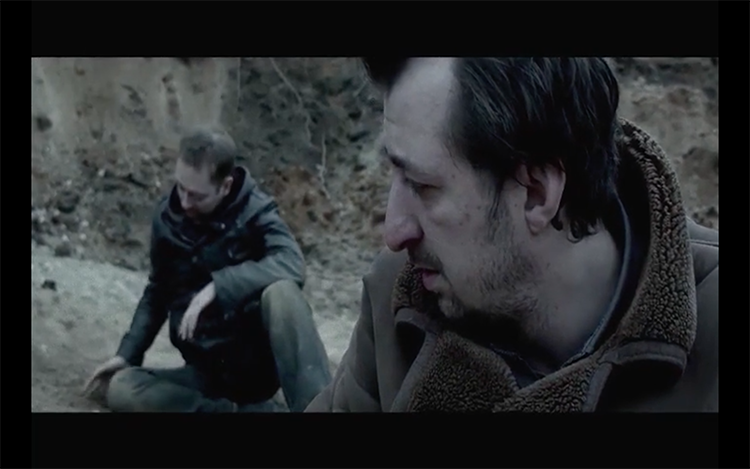
A Screenshot from the novel of «Chronotop»
Another advantage of the project is that it is universal, that is it can exist as an auteurism short piece and be shown on its own at a film festival or be presented in any almanac combinations. For example, for «Kinoshock» I made a 25 minutes’ selection, for «Listapad», if our Ministry does not get scared, it would be 40 minutes. So I can keep changing the order and combinations and it might shape new meanings. Perhaps on the Internet it would be possible for the spectators to choose an episode themselves — and the program would construct a certain «random» story: they would be able to watch movies in various combinations. It will be an interactive thing similar to Cortazar’s, when the chapters’ order changes the novel.
The universal character of the project also lies in the fact that it can be a Belarusian «Chronotope». By the way, for «Kinoshock» I presented it as «#375», Montenegrin, Latvian, doc-chronotope, chronotop-selfie, etc. — the combinations may occur according to different principles.
— Is «cinetweet» a finished film? As a curator, do you have any strict selection principles?
А. К.: I do not have such, and it does not necessarily have to be a finished film. I moderate the directors intuitively without imposing any restrictions on them, the same way Kashin moderates his tweeter: something appears in commentaries, something is missing, and doing this he forms a certain direction. I compare this method with two bodies of art: with Kurt Schwitters’ eclectic MERZ column and Antonio Gaudi’s cathedral he had not finished and which after his death others have been building up. There was no definite architectural project, he only had an idea later followed by the authors’ improvisations.
— But how do you formulate the task and define thematic framework?
А. К.: There are only some principles which are important for me. Firstly, minimalism is welcomed, secondly — radicalism, thirdly — a possible anti-self-censorship and finally — timing. It is also desirable if there is some reference to not really mythology, but to a clash of different hyper-realities — sacred and profane ones, surreal and mundane, political and apolitical. Everything must be related to the paradox. Do you remember time when everyone was toying with the idea of anthologies, such as «Minsk, I love you»? Well, «Chronotope» began with anti-«Minsk …». This is not an almanac, there is no single style or a candy caramel censorship, and participation in it does not oblige you to anything. Novels are not linked to one another: there might be rather an associative connection, maybe some phrases and visual quotations. There is also such a principle: I do not want authors’ names to be mentioned anywhere, we all will sign as «Chronotope» art group.
So, it is the eclecticism I want it to work with to have aesthetically different styles. Well, yes, mumblecore type films seem to be trendy now, but I still treat them with suspicion: they are all shot in the same key. In general, at the moment literature and feature films have lost their form, there are no adventures, the genre as such is absent. Even what we tried to combine in «Massacre» — a mix of genres — caused harsh rejection at the level of critics, who supposedly should enjoy such games. There are almost no virtuosos of the genre left, most of them hide behind the reality, and readers and viewers are still attracted by drama, plot twists, etc. That is why today there is so much attention to, for example, non-fiction. The same thing happens in the cinema.
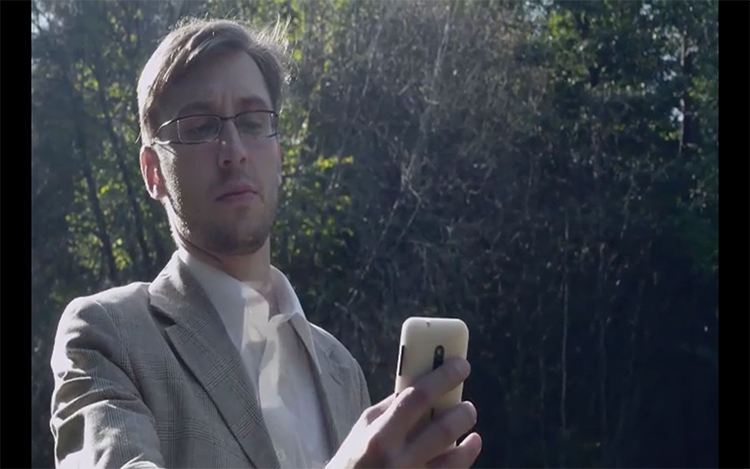
A Screenshot from the novel of «Chronotop»
But what concerns the format of «Chronotope», I insisted on not introducing the classical drama, because it is a short meter and one can easily turn it into an anecdote: two standard twists, climax and denouement. Ambiguity and the spirit of experiment are important for me, I even offered the participants not to write a finished script but to leave everything at the level of the application in order to develop the idea in process. However, I do provide those who face problems with the idea with some ready-made literature, for example Adam Hłobus’ short stories.
— How many «cinetweets» are ready yet?
А. К.: Many, but there are around 7-8 novels which can already be shown to the public. One work, a film «The Brokeback Mountain’s Mystery» made by Janusz Gawryluk, the founder and organizer of the festival of Belarusian cinema in Warsaw «BulbaMovie», has already been awarded at the ІV Festival «Kołobrzeski Festiwal Filmowy». Well, and a «Kinashok» award. And I think this is only the beginning.
— Apart from all the artistic and educational aspects «Chronotope» is, in fact, a unique material for research. I mean, you get an opportunity to study a certain layer of the time we live in – different people, social classes, topics, the participants’ age… Can you already give some kind of assessment and share your thoughts formed in the course of your work?
А. К.: I still do not have enough material, maybe mumblecore boys, like Mikita Łaŭrecki, need to come, it is they who deal with the chronicles of everyday life where there is no plot, no form, but the reality adequate only to itself is presented. They are a sort of «new wave» emerged before the epoch of computer mice, they are people from another planet, and without them there would not be any serious research.
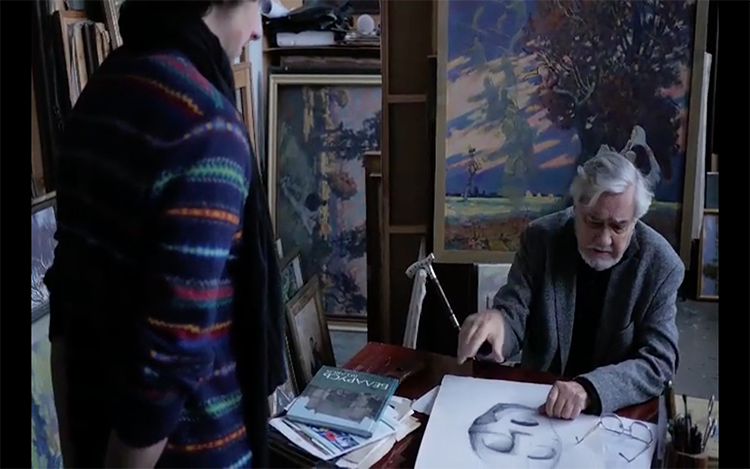
A Screenshot from the novel of «Chronotop»
Nevertheless they do not constitute the core, and this is where the project’s universal nature lies in. Julija Čarniaŭskaja (Yulia Chernavskaya) has an idea that the Belarusians are united by «third culture». I think this is gossip and accidents that appear due to mythology, thus I emphasize the rites and rituals of the contemporary world — I see them as universal. By the way, I have thought of a «mild» conceptual variant for Belarus — «Chronos Topos», as if totally immersed in time.
I think our country is quite adequate to our times: our neighbors are involved into a certain apparent madness, whereas we have a Zen dream. And perhaps it is even better for us: the swamp is the preservation of some unique species, so we are preserving them.
Once we have already talked with you about the state of liminality, when, on the one hand, it is the same preservation, and on the other — a coma, the existence in the transitional world. But, I repeat, it may be even better for us now – to freeze in order to survive.
— You used to appeal to the young cinematographers, saying that now everything is available: but where is our Belarusian cinema then? Has the situation changed? Or we can actually start talking about Belarusian cinema now?
А. К.: Something is making its way, last year basically pleased me. But it turns out that everything develops somehow naturally: these guys, let us say mumblecore, are only 19-20 years old now, their time is still to come. Therefore, in future it will be even more interesting. I have recently listened to a Dmitry Bykov’s lecture, where he spoke about the coming generation of «ludens» described by the Strugatskys, and so now we have a similar situation. Completely different people are coming who can write a Ph.D thesis within a week. They already belong to a different time, they do have a specialization, they are polymath. The same Laŭrecki — he makes sound himself, as well as editing, he plays himself and it is all right.
But, on the other hand, they would be likely to despise such movies as mine, even though what they do seems nice to me, but not in large doses as Rohmer’s films where people walk and talk a lot, but you fail to stand such movies for long. Nevertheless, as an alternative they must exist. In general, I think it would be interesting to make such a project, maybe within «Chronotope», as cine-selfie, cine-skype, etc.
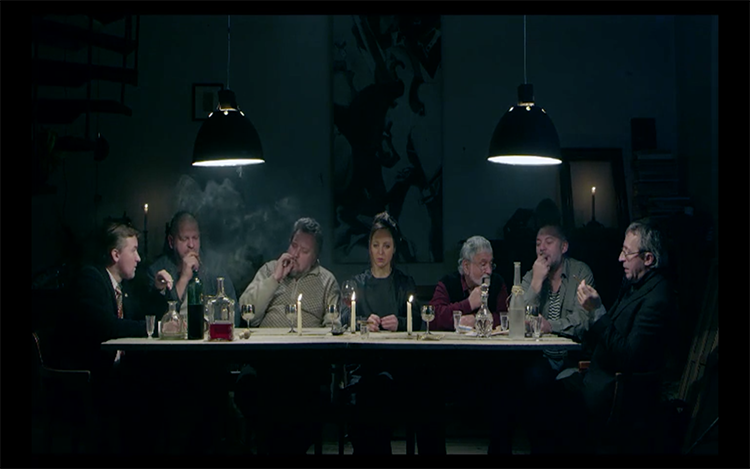
A Screenshot from the novel of «Chronotop»
— At the beginning of our talk you said that the world has changed. Does «Chronotope» turn out to be your personal reaction, a challenge to this «new» world? How would you describe it? Where exactly is its «novelty» and how can we resist it?
А. К.: The world’s very essence has changed, other things used to be demanded in cinema — money, technique, and now the emphasis is on people. The main thing is the human resource. For example, our method of production is crowdsourcing: people lend their cameras, cars, etc. A full meter can be shot on people’s mere enthusiasm today and you will even get a prize in Cannes. Moreover, the new people I have already mentioned go ahead easily — they do not have communication problems, no problems with language. So, you can resist this «new» world only through the emphasis on human resources, through the maximum autonomy of the individual — to live where one wants, to make a living on the Internet and be free in moving around the world. Such an absolute withdrawal from public pressure and ideology.
The world is diverse, it is both global and autonomous, anarchist in a sense, so this political context had gone the other way, there is no point in it any more.
Coming back to «third culture», there is a mainstream culture, elite one and «the third», which today represents these very young people with some trash tastes and universal character, but I think that they are the future. And I wonder what they will grow into later.
— Probably, somewhere it will really happen, if to speak about the cinema, but in the light of the discussion of a new law on cinema production in Belarus it seems that the Belarusian cinema will fall into even a deeper coma. How can you comment on this? Who benefits from such a law?
А. К.: It is definitely beneficial to the post-Soviet state structures of film production and financing, helpless in the face of the contemporary cinema and time. They cannot figure out how to make a movie a hundred times cheaper and more efficient. In their turn, they do not want to become more modern, change, grow and take responsibility for their sluggishness and inertia, moreover they are not able to compete with the same generation of twentysomethings, in whose hands there lies not only future but also the present. And to the state as a whole (despite the intentions and wording supposedly good for it) this document will bring irreparable harm — again the taxpayers’ money «will fly into the pipe,» and one more channel of live air will be blocked for the living movement of those coming from below, those who do not need a dime, but keep developing our culture and present it to the whole world, making our country recognizable and attractive.
Interviewed by Tania Arcimovič
Translated by Volha Bubič
Opinions of authors do not always reflect the views of pARTisan. If you note any errors, please contact us right away.



